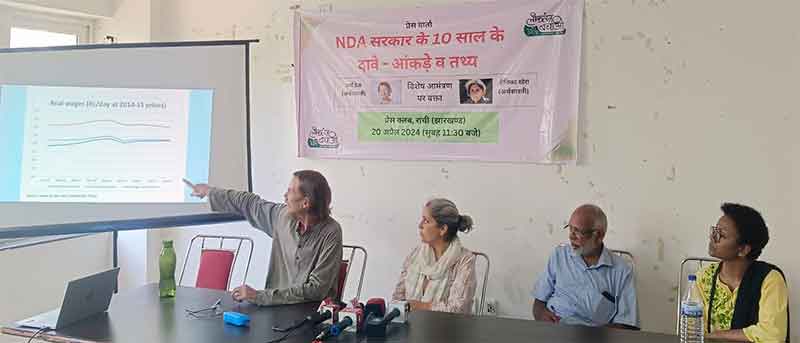
RSS ideologues and leaders regularly keep stating that India is a Hindu Rashtra. This has been most annoying for the religious minorities, particularly Muslims, Sikhs and all those believing in Indian Constitution. This Dussera; when RSS supremo Mohan Bhagwat; in his hour long speech reiterated the same formulation, a large number of Sikh organizations and intellectuals showed their opposition to it and at many a places protests has been planned against this statement.
Editorials in prominent Punjabi newspapers like Punjabi Tribune and Nawa Zamana criticized the statement in strong terms. While the Shiromani Gurudwara Prabandhak Committee (SGPC) and the Shromani Akali Dal (SAD) which is a constituent of the NDA and has been an ally of BJP also gave strong reaction to the statement of Mr. Bhagwat. Giani Harpreet Singh, the acting jathedar (head priest) of Akal Takht said that he believes the RSS’s actions will create divisions in the country. “The statements being made by RSS leaders are not in the country’s interests,” he told the media in Amritsar on Monday. Also Punjab Lok Morcha chief Amolak Singh stronger language to point out that the statement was part of a bigger conspiracy and must ring alarm bells.
This strong reaction against Bhagwat’s statement from Sikh organizations has a reason behind it. Sikhs are being projected as part of Hinduism by RSS so this strong reaction from these organizations. This is not the first time that Sikhs are showing such a reaction. One recalls that in the past also similar statements from Hindu nationalist organizations have drawn such an opposition and criticism. In year 2000 when K. Sudarshan was the Sarsanghchalak he went on to say that Sikhism is a sect of Hindu religion and Khalsa was created to protect Hindus from Mughal tyranny. RSS has also floated an organization, Rashtriya Sikh Sangat, to co-opt Sikhism into the fold of Hinduism. Even earlier there were protests in Punjab.
The origin of Sikhism with Sant Guru Nanak has been one of the major phenomenons of Sixteenth Century in India. Guru Naka’s teachings came in the backdrop of prevalent Brahmanism to which he and his successors were opposed. Sikhism’s teachings drew from Bhakti-Sufi saints in particular. The latter were for egalitarian values away from the Brahmanical rigidities and inequalities dictated by them. Guru Nanak was inspired by Saint Kabir and Baba Farid in particular. Sikhism drew from diverse sources, the teachings which focused on humanism and equality of all beings. Nanak denounced orthodox practitioners of Islam as well as Hinduism and placed his emphasis on the vibrant intercommunity relationships based on the subaltern versions of Islam and Hinduism. His teachings at one level are a synthesis of the values of both the religions like reincarnation and the doctrine of Karma from Hinduism and oneness of God and congregation in worship from Islam. Sikh Gurus opposed Caste, worship of Cow and sacred thread. As this religion evolved it developed its own identity with Guru Granth Sahib as its major tome and other practices which had deep roots in intercommunity interactions.
The assertion of RSS about Sikhsim being sect of Hinduism is a part of political agenda of Hindu nationalism. It begins with the definition of Hindu by Savarkar, where Hindu is one for whom the land spread from Sindhu river to seas is their holy land and father land. This definition cleverly puts Muslims and Christians separate from the groups of people who own this land. Going further Islam and Christianity, despite their being very old were labeled as ‘foreign religions’. The attempt was to bring together all non Muslims-non Christians in a political mobilization for Hindu nation.
With time due to the political contingencies the definitions kept changing. As initially the word Hindu was used for this land spread from Sindhu River to the seas, the attempt is also on to co-opt all others in to the fold of Hindutva politics, in this direction now even Muslims and Christians are now called as Hindus in their scheme of things. This is a clever maneuver. First to call everybody as Hindus and then to impose the Hindu identity symbols: Cow, Gita, Ganga, Lord Ram: on them as their deities. This is a political intervention into the realm of religion. Murali Manohar Joshi, when he became President of BJP (1990), cleverly put that all the Muslims are Ahmadiya Hindus and all Christians are Christi Hindus.
The problems with their formulations are multiple. The confusions which they try to create are also multiple. The Jains demanding minority status had been a long struggle. The followers of Buddhism or Sikhism in no way can forget or give up their own religious identity. Earlier also attempts were made to undermine Sikh identity and Punjabi language. In the face of that Bhai Kahan Singh wrote a book, “Hum Hindu nahin” (we are not Hindus). While RSS cabal wants to call them Keshdhari Hindus (Hindus who are not cutting their hairs, long hairs and beard), Sikhs own self perception is that of being Sikhs at religious level.
So many a Sikhs ideologues have clearly stated that each Indian should follow their own religion and RSS should not try to impose the Hindu norms on Sikhs, whose traditions have been very syncretic and away from Brahmanical norms. It is in line of this that Guru Granth Sahib draws from Saint Tradition, Sufi and Bhakti both. One recalls that it was Miyan Mir who was invited to lay the foundation stone of Golden temple, the major Sikh Shrine, where intercommunity meals mark the unity of communities away from caste and religious boundaries.
Rashtriya Sikh Sangat, an arm of RSS is active in Punjab in propagating that Sikhism is a sect of Hinduism. RSS agenda of Hindutva, Hindu nationalism, which has Brahmanical values at its base, is far away from what Sikhism stands for, so no wonder that most of the Sikh groups and ideologues are standing in unison to oppose the statement that India is a Hindu Rashtra.
Ram Puniyani was a professor in biomedical engineering at the Indian Institute of Technology Bombay, and took voluntary retirement in December 2004 to work full time for communal harmony in India. He is involved with human rights activities from last two decades.He is associated with various secular and democratic initiatives like All India Secular Forum, Center for Study of Society and Secularism and ANHAD. Response only to [email protected]
SIGN UP FOR COUNTERCURRENTS DAILY NEWS LETTER










































